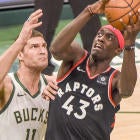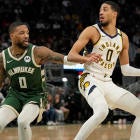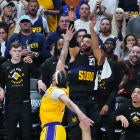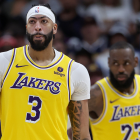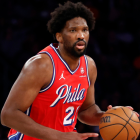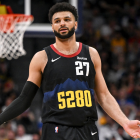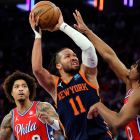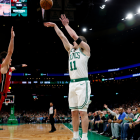TORONTO -- Monday was an off-day in the Eastern Conference finals, but the Milwaukee Bucks and Toronto Raptors competed. The afternoon after their double-overtime marathon at Scotiabank Arena, both teams wanted the world to know that, actually, they didn't even play that well. And they both believe this bodes well.
"It's a very good thing for us," Bucks forward Nikola Mirotic said. "We know that [despite] playing bad basketball, we were there. It's just about little things to adjust that are going to make a huge difference for us, and I don't see us shooting the ball that bad as we shoot it last game. So I'm sure we're going to shoot better the ball, and defensively we're fine."
Milwaukee lost 118-112, but could be ahead 3-0 if it had shot better than 14-for-44 from 3-point range. Giannis Antetokounmpo, the likely MVP, scored 12 points, his worst scoring night in four months, on 5-for-16 shooting, with eight turnovers. An optimist might say that it is a minor miracle that the Bucks were able to overcome all this and take the game to double-overtime. Forward Khris Middleton lamented the "great looks" that he, Mirotic and Brook Lopez missed, but said this only showed how dangerous they could be when their shots inevitably fall.
"We fought," Middleton said. "We competed. A few shots didn't go down for us. But at the end of the day, we're on the road. We forced it into double overtime and we had a chance for a win. We just couldn't get a stop or two when we needed to. We couldn't get a bucket when we needed to here or there."
Raptors guard Kyle Lowry did not seem to buy the idea that Game 3 was a moral victory for Milwaukee. "That's their opinion," he said. "They felt they didn't play well, we didn't play well, either. Both teams shot under 40 percent."
It is true: Toronto shot 39.2 percent, largely because Danny Green, Fred VanVleet and Serge Ibaka missed 25 of their 29 combined shots. Neither team scored efficiently, especially in the halfcourt, and both teams surely kicked themselves for their missed opportunities when they watched the film. Green mentioned that Bucks guards Malcolm Brogdon and George Hill came off the bench and shot well, but acknowledged that all the players in this series probably think they have room for improvement -- even Kawhi Leonard. The superstar saved the day with 36 points on 11-for-25 shooting, but he missed some jumpers before his clutch heroics.
"I mean, that's how they're supposed to feel," Green said. "We didn't play well, either. We kind of survived that game with how poorly we shot the ball, but we haven't had a good shooting game as a team the whole series. I'm expecting we'll shoot better in Game 4. Me, Fred and Serge had some pretty decent looks, some clean ones that just didn't drop for us."
The logic is the same as when an analyst tells you that some team should be thrilled at halftime because it is "only down X points" when it started slowly, its best player is struggling or some other calamity has hurt them less than you might have expected. Imagine if life worked this way: "My behavior has been self-destructive for two weeks, but I haven't totally alienated everyone around me or suffered life-changing consequences. Hooray!"
There is, however, some good sense behind the posturing. Even the world's best shooters sometimes have cold nights, as long-distance shooting is inherently volatile. In general, it is wise to judge every possession on its process rather than its result. If it breeds confidence, it is healthy for a team to believe it is just a tweak or a lucky break away from victory. I like the idea of turning a poor performance into an anxiety reliever.
Heading into Game 4 on Tuesday, the Raptors can tell themselves that they could have a 2-1 lead if they had conjured a few more minutes of inspired play in the series opener. The reality, though, is that every game has its own shape, and no team is entitled to an average amount of open shots going in. There is a cliche that great teams find ways to "win ugly" when they're not at their best, but I prefer to think of it in terms of problem-solving. Unlucky bounces are no different than injuries and sloppy turnovers, in the sense that they happen to everyone, with direct and indirect consequences. Great teams accept this, but the trick is knowing when problems go beyond bad luck.
Toronto's 3-point shooting, for example, has been wildly inconsistent in the playoffs. Milwaukee's has been rough all series, especially if you take Brogdon out of the equation. "I don't think we have played our best basketball," Siakam said, and that is technically correct for both teams. There is something undeniably weird, though, about professional athletes arguing over who has played worse or missed more open shots as a proxy for arguing over who has the edge. When shots aren't going in, players must play more disciplined defense, create fast-break opportunities and do the boring little things -- sharp cuts, strong screens, crisp passes -- that energize an offense. Both of these teams are terrific on defense, and it's possible that neither will appear particularly comfortable playing against each other.
Before he had coached an NBA game, Raptors coach Nick Nurse told me that coaches are always "chasing perfection in an imperfect game." In this series, neither team has approached basketball nirvana, but that is usually the case this time of year. Perfection is always elusive, and the chase is merely about getting closer than the opponent.













